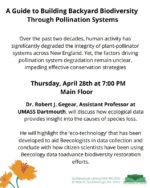In previous posts, I shared info on an outdoor concert and Garden Tour scheduled for this Saturday at the Southborough Library. The Open Space Preservation Commission announced that those Planet Palooza events are indefinitely postponed.
OSPC is working on rescheduling, hopefully to a date in June. Stay tuned for those details.
In the meantime, there is one more Planet Palooza event still happening this week:
 A Guide to Building Backyard Biodiversity Through Pollination Systems
A Guide to Building Backyard Biodiversity Through Pollination Systems
Thursday, April 28, 7:00 – 8:30 pm
A Presentation by Dr. Robert Gegear
Southborough Library 25 Main Street SouthboroughOver the past two decades, human activity has significantly degraded the integrity of plant-pollinator or ‘pollination’ systems across New England, with many of our historically abundant native flowing plant and pollinator species now locally extinct and others soon to follow if do not take immediate conservation action. The loss of species from plant-pollinator systems poses a significant threat to natural ecosystem function and service due to the fundamental role that ‘pollination products’ play in supporting wildlife diversity across trophic levels. Yet, the factors driving pollination system degradation remain unclear, impeding the development of effective conservation strategies. Dr. Gegear will discuss how ecological data collected through his Beecology Citizen Science Project is being used to gain insight into the causes of species loss from long-tongued bee and butterfly pollination systems native to New England.
He will also highlight the ‘eco-technology’ that has been developed to aid Beecologists in the collection of species interaction data, including the launch of a new version of the webapp with automated butterfly and plant ID functions powered by iNaturalist in Spring 2022. This presentation concludes with an overview of how citizen scientists have been using Beecology data to significantly advance biodiversity restoration efforts in Massachusetts over the past 3 years.
Dr. Robert Gegear will discuss how ecological data collected through his Beecology Citizen Science Project is being used to gain insight into the causes of species loss from long-tongued bee and butterfly pollination systems native to New England. He will be reviewing data from Breakneck Hill Conservation Land in Southborough which was his first research site starting in 2015.
Over the past two decades, human activity has significantly degraded the integrity of plant-pollinator or ‘pollination’ systems across New England, with many of our historically abundant native flowing plant and pollinator species now locally extinct and others soon to follow if do not take immediate conservation action.NOTE: This presentation includes data from his new research on butterflies and includes the launch of a new version of the Beecology webapp with automated butterfly and plant ID functions powered by iNaturalist.
Dr. Robert J. Gegear
Assistant Professor, Department of Biology, UMASS Dartmouth
Director of the New England Bee-cology Project (beecology.wpi.edu, biocsbridge.wpi.edu)
Lab Website: gegearlab.weebly.com
Plant list Plants for pollinators at risk – GEGEAR LAB AT UMASS DARTMOUTH (weebly.com)
(You can read more on the background of OSPC’s work with Dr. Gegear here.)
Updated (4/27/22 8:37 am): OSPC shared more details on Thursday night’s event.

